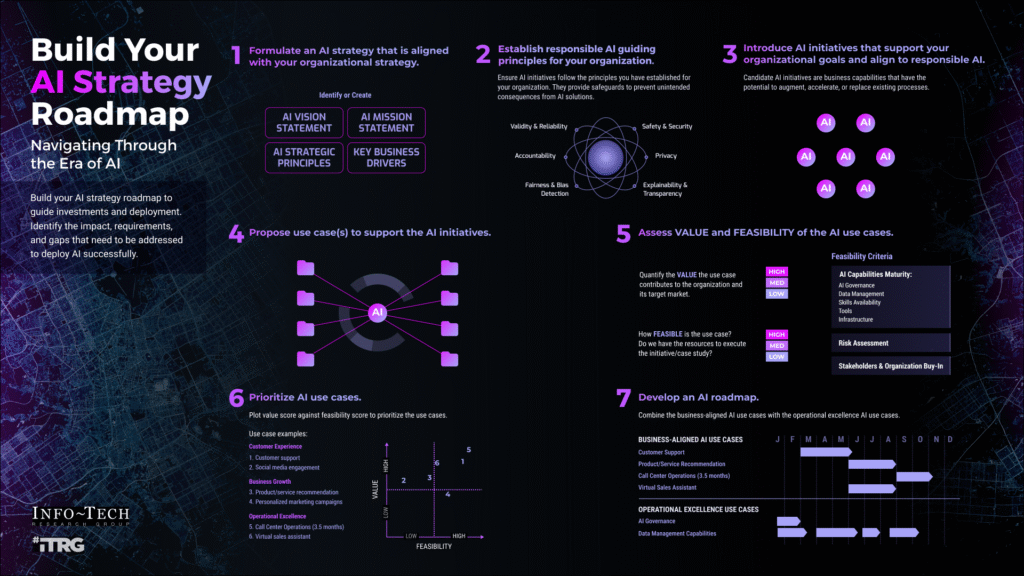Introduction
We are witnessing a transformation unlike any before Artificial Intelligence (AI) is redefining the world of business. From automating tasks and optimizing Analyzing the Impact of AI on Modern Business Strategies operations to revolutionizing customer experiences. AI is no longer a luxury or experiment its a strategic imperative. Businesses of every size are integrating AI into their models to enhance efficiency reduce costs and gain a competitive edge.
This article explores how AI is reshaping modern business strategies across industries the technologies behind this revolution the risks and how organizations can build a future proof AI strategy.
Is AI in the Context of Business
Artificial Intelligence refers to the capability of machines to mimic human thinking and decision-making processes. In the business environment AI is applied to
- Automate processes (Robotic Process Automation)
- Analyze big data for insights
- Personalize marketing
- Improve customer service (chatbots virtual assistants)
- Forecast demand and trends
- Manage risks and fraud
AI isn’t limited to futuristic robotics it’s already embedded in many business tools you use today like CRMs ERPs recommendation engines and predictive analytics platfo
AI’s Core Technologies Powering Modern Business

Here are the key AI technologies revolutionizing business today:
Machine Learning (ML)
Enables systems to learn from historical data and improve over time.
Use Case: Banks use ML to detect fraudulent transactions based on patterns.
Natural Language Processing (NLP)
Helps machines understand, interpret, and respond to human language.
Use Case: Customer service chatbots and virtual assistants like ChatGPT.
Computer Vision
Allows machines to interpret and analyze visual information from the world.
Use Case: Retail stores using cameras for shelf management or crowd tracking.
Robotic Process Automation (RPA)
Automates repetitive rule-based tasks across departments.
Use Case: Automating invoice generation in finance.
Generative AI
Creates new content designs or ideas using algorithms.
Use Case: AI-generated marketing copy logos videos and even code.
AI Is Shaping Business Strategy
Business strategies are being realigned to leverage AI’s potential. Here’s how it’s influencing major aspects of strategic planning:
Data Driven Decision Making
AI makes it possible to sift through massive data sets to uncover actionable insights. From sales trends to customer behavior, businesses are using predictive analytics to make faster and more accurate decisions.
Example
Retailers like Amazon use AI to forecast product demand optimize inventory and set dynamic prices based on buyer trends and market data.
Transforming Customer Experience
AI is revolutionizing how businesses interact with customers.
- Chatbots handle thousands of queries 24/7.
- Recommendation engines personalize user journeys.
- Voice AI powers smarter support systems.
Case Study:
Netflix uses AI to suggest shows increasing user retention and engagement.
Automating Operational Efficiency
Tasks that once required hours can now be done in minutes.
- HR: Resume screening and employee onboarding
- Finance: Invoice processing and fraud detection
- Logistics: Route optimization and predictive maintenance
AI-driven automation cuts operational costs by 20% to 40% in many industries.
Enhancing Risk Management
AI helps businesses identify potential risks and respond proactively.
- Credit scoring in finance
- Cybersecurity anomaly detection
- Supply chain disruptions prediction
Banks and insurance companies now rely on AI for real-time fraud alerts and claims assessment.
Marketing & Sales Optimization
AI improves marketing ROI by:
- Segmenting customers with precision
- Automating campaign management
- Forecasting buying behavior
- Personalizing outreach
Salesforce HubSpot and other CRMs have integrated AI to boost lead conversion rates by 30% or more.
Industry Wise Impact of AI
Let’s explore how AI is transforming strategies across different sectors.
Healthcare
- AI Diagnostics: Tools like IBM Watson detect diseases with high accuracy.
- Telemedicine: AI-powered virtual consultations
- Personalized Medicine: Genetic data + AI = tailored treatment
Strategic Outcome: Faster diagnoses reduced costs improved patient outcomes.
Retail & E-commerce
- AI Recommendations: Amazon, Shopify
- Smart Warehousing: Robotics + AI optimize logistics
- Virtual Try-Ons: Enhances online shopping experience
Strategic Outcome: Increased sales reduced returns better CX.
Finance
- Algorithmic Trading
- Fraud Detection
- Risk Management
- Personal Finance Advisors (Chatbots)
Strategic Outcome: Lower risks improved compliance higher customer satisfaction.
Manufacturing
- Predictive Maintenance to avoid machine downtime
- Smart Robots in assembly lines
- Quality Control through computer vision
Strategic Outcome: Lower costs zero defects continuous production.
Logistics
- Route Optimization using AI maps
- Demand Forecasting
- Drone Deliveries in experimental stages
Strategic Outcome: Faster deliveries lower transport costs enhanced logistics network.
Education
- AI Tutors for personalized learning
- Plagiarism Detection
- Smart Assessments
Strategic Outcome: Enhanced learning outcomes reduced educator load.
Challenges in AI Implementation
Despite the potential AI comes with its own set of challenges:
Data Privacy Concerns
AI relies on vast amounts of data, raising privacy and compliance issues (e.g., GDPR, PDPA).
Integration Complexity
Legacy systems may not support AI tools requiring costly overhauls.
High Initial Costs
AI systems require upfront investment in infrastructure training and software.
Change Management
AI adoption may face resistance from employees fearing job loss.
Bias in AI
AI systems may reflect biases in the training data leading to unfair outcomes.
How Businesses Are Adapting: Real-World Strategies
Here are the top strategies forward looking companies are adopting to integrate AI effectively:
AI-First Business Models
Companies like Uber Netflix and Airbnb were built with AI at the core.
Cross-Functional AI Teams
Organizations now hire AI strategists data scientists and AI ethicists to oversee responsible implementation.
AI + Human Hybrid Models
Rather than replacing people businesses are using AI to augment human abilities.
Partnerships with AI Vendors
Instead of building in house many businesses use AI-as-a-Service from Amazon (AWS) Google (Vertex AI) and Microsoft Azure.
The Future of AI in Business (2025–2030)
As we move ahead AI will become even more embedded in core business strategy:
- Autonomous decision-making will be common in supply chains.
- Generative AI will dominate marketing and design workflows.
- Emotion AI will personalize customer experiences further.
- AI Governance will become a key boardroom topic.
Experts predict that by 2030 70% of businesses will rely heavily on AI for decision-making.
AI Adoption Statistics (2025 Snapshot)
- 95% of Fortune 500 companies have AI strategies in place.
- 78% of marketers say AI boosts customer retention.
- 45% cost savings reported from AI in logistics.
- 85% of financial institutions use AI for fraud detection.
Best Practices for Building an AI-Powered Strategy

Start with Clear Business Objectives
AI is not a solution in search of a problem identify your goals first.
Audit Your Existing Data
Quality data is the fuel for effective AI. Clean and structured datasets matter.
Choose Scalable Tools
Invest in platforms that grow with your business needs.
Prioritize Ethics and Transparency
Avoid AI models that are black-box and unexplained.
Train Your Teams
Upskill employees to work alongside AI not against it.
Conclusion
Artificial Intelligence is not just changing what businesses do it’s transforming how they think. It touches every part of a modern business strategy from operations to marketing finance HR logistics and customer care. The organizations that embrace AI thoughtfully and ethically will lead their industries into a future defined by agility personalization and intelligence.
AI is not the future of business it is the present. And companies that fail to adopt AI risk falling behind.
So whether you’re running a small startup or managing a global enterprise now is the time to reimagine your strategy through the lens of AI.

